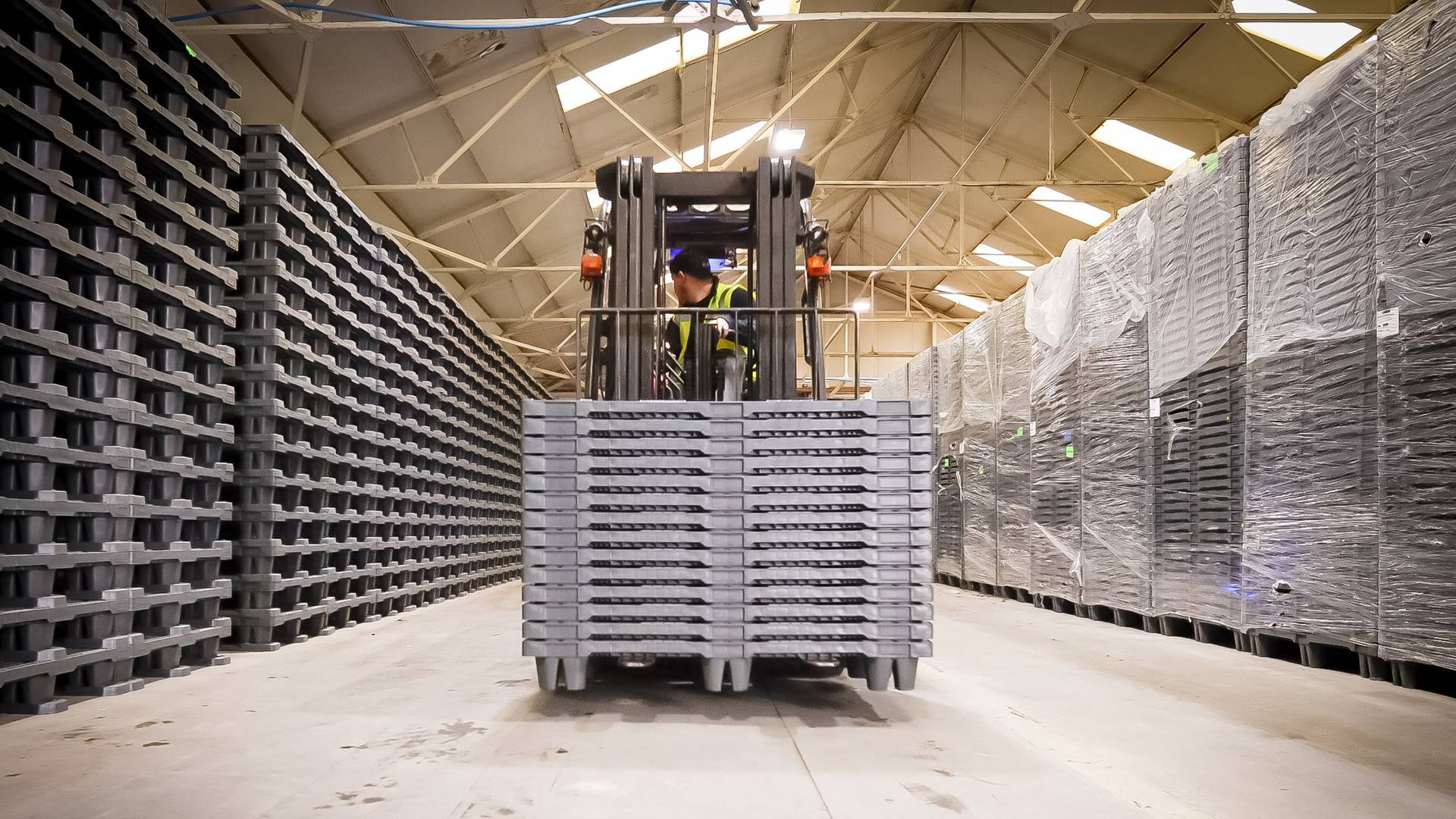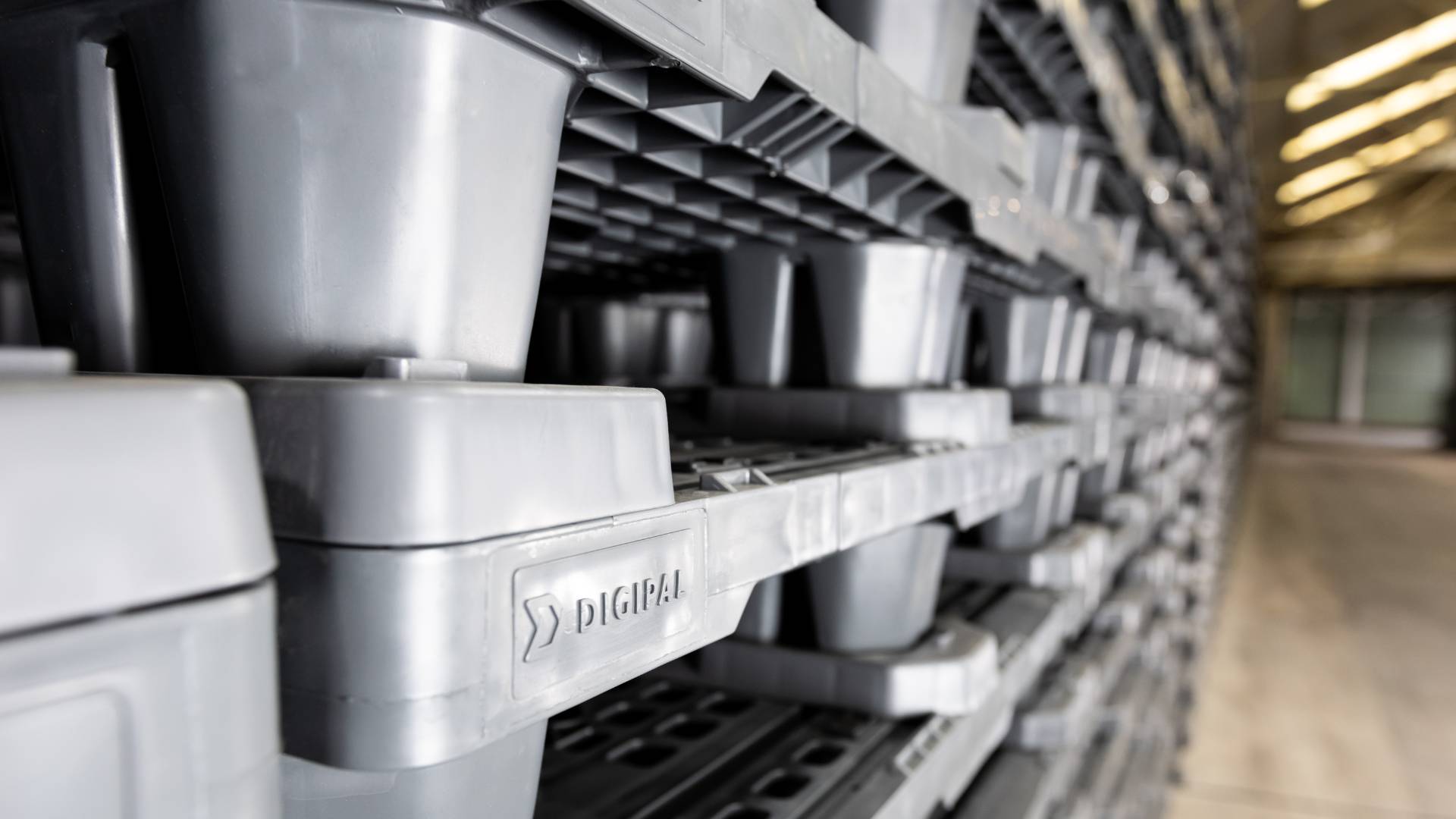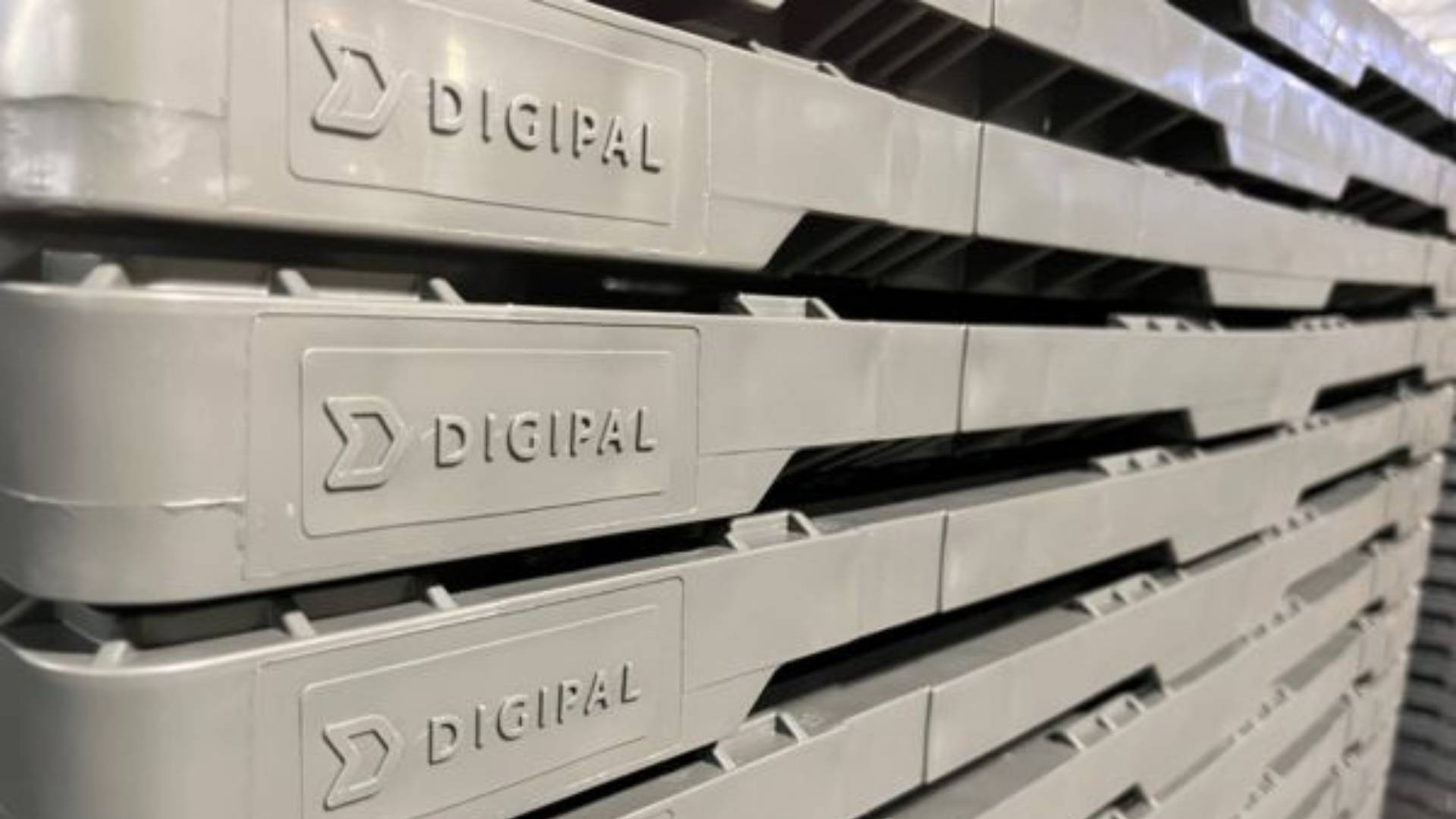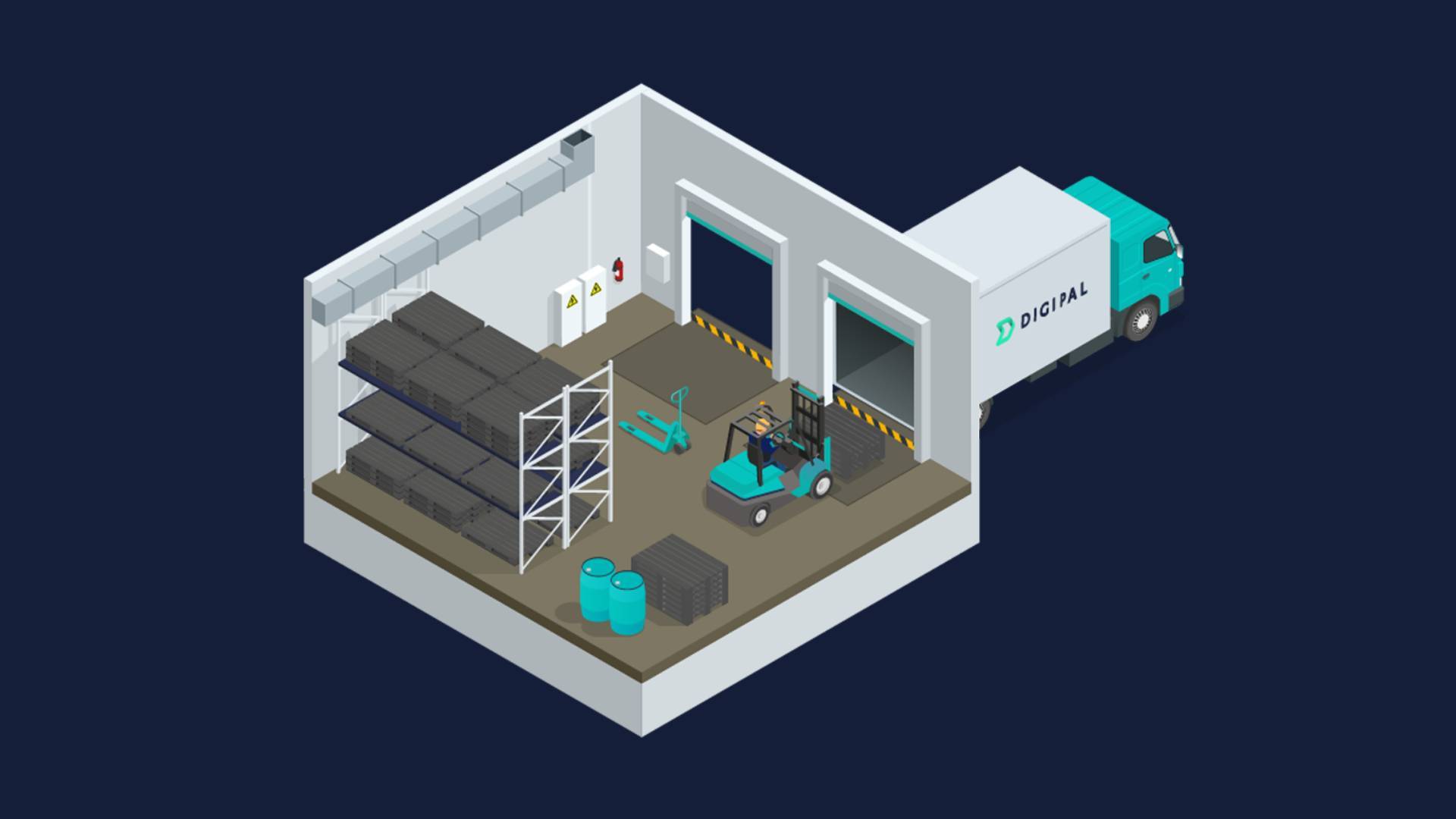Logistics and operations managers in the retail industry are under increasing pressure to cut costs, boost efficiency and improve sustainability efforts across supply chains.
One way to work towards all three of these objectives is to implement reusable and trackable plastic pallets.
Let’s explore 15 reasons why retailers are making the switch to plastic pallets and how tracking them can help you save time, money, space and the planet.
1. Durability
When it comes to choosing pallets for your supply chain, durability is crucial.
With plastic pallets, you know you can be confident in your purchase, with these pallets proven to be far longer-lasting than wooden ones.
Our data tells us that Digipal Plastic Pallets last around 250 trips before they require significant repair.

2. Sustainability
The shape of plastic pallets, which are designed to be more streamlined and convenient, means that more can be transported per journey, reducing CO₂ emissions.
Due to their superior durability, fewer plastic pallets need to be made, minimising impact on the environment and increasing the number of journeys completed before replacements are pooled, rented or purchased.
Many people think plastic has a negative impact on the environment but, in fact, it’s how we dispose of it. Digipal Plastic Pallets are 100% recyclable and, at the eventual end of their life cycle, they are ground down and used to create new pallets.
3. Safety
Wooden pallets can be a safety concern, causing splinters, puncture wounds, cuts and grazes.
Each of these hazards are either eliminated or considerably reduced when using plastic pallets.
Their sturdy nature also means they do not break under excessive weight, providing improved safety for both people and products during loading, storing and transportation.

4. Automation
Wooden pallets can vary in size, shape and weight due to their very nature.
Many plastic pallets, including Digipal’s, are created with a mould. This means they are uniform in size and weight, causing less disruption to automated processes.
5. Transportation
When it comes to transportation, the shape and size of your pallets is crucial. The larger and more inconvenient the pallet, the fewer will be transported in one go.
On average, you can fit 540 wooden pallets per truckload.
By comparison, you can fit 910 nestable plastic pallets per truckload, helping you save money, time and the environment with each journey.
6. Visibility and traceability
Another advantage of plastic pallets is that they can be tracked using the DigiPortal, giving you end-to-end visibility across your supply chain.
Asset tracking allows you to make data-led decisions, identify and address bottlenecks and streamline your processes. These benefits lead to improved sustainability and reduced expenses.
The DigiPortal, our customisable asset tracking platform, comes with plenty of benefits, including:
- A customisable dashboard
- Unparalleled accuracy
- Unlimited scalability
7. Supply chain optimisation
Digipal has access to a wide range of technologies and can identify which is most suitable for your supply chain. For example, we use cellular 4G technology for our clients Asda toyou and Mediq but, for larger fleets, we would implement Wiliot Bluetooth or RFID technology.
With Digipal, you can access your asset tracking data via your fully customisable dashboard on the DigiPortal, which offers granular detail and unlimited scalability.
8. Space saving
Optimising warehouse space helps you reduce unnecessary overflow costs such as renting extra space or using third-party storage.
Due to their design, and the fact they come in a range of shapes and sizes, plastic pallets enable you to maximise your warehouse space and during transport.
At Digipal, we offer the only RAN (rackable and nestable) pallets on the market. These pallets allow you to store and transport much more efficiently.
9. Weight handling
When purchasing plastic pallets, it’s important you understand the weight capacity and dimensions you require.
Digipal’s Plastic Pallets come with a BS 8611 testing certificate. This means they have tested to the highest level of safety standards. You can rest assured that they are safe and capable of holding your products.
When specifying weight handling capability, plastic pallets are split into the following categories:
Static: 7,500kg
Dynamic: 2,500kg
Racking: 1,250kg
(Static refers to floor loading weight, dynamic refers to moving weight and racking refers to open two beam weight.)

10. Lightweight nature
Wooden pallets are often considered bulky, awkward and easy to damage.
Despite their impressive lifespan, strength and ability to handle large loads, plastic pallets are lighter than traditional wooden pallets.
Despite their advanced durability, plastic pallets are also more lightweight than their wooden counterparts, making them easier to transport.
Digipal Plastic Pallets weigh just 18kg (40lb), which is at least 10kg fewer than traditional wooden pallets.
11. Cost-effectiveness
While it’s more expensive to manufacture Plastic Pallets, their operating cost is cheaper than the wooden pallets, meaning that over the life span of the project, the plastic pallets deliver a better ROI.
When purchasing plastic pallets, it’s important to consider not just the upfront price, but the Total Cost of Ownership (TCO). This term refers to the consideration of the ongoing cost of maintenance, transportation and storage, among other factors.
12. Exclusion from border inspection
Another benefit of plastic pallets is that they are exempt from ISPM15, a regulation which applies to the transportation of wooden materials.
This means plastic pallets are much easier to work with in global logistics, making international shipping simpler, improving crossing speeds and reducing transport costs.
13. Moisture resistance
Wooden pallets can absorb moisture more easily. Not only does this make wood a fertile breeding ground for bacteria, mould and fungi, but it also causes it to expand, warp and crack, creating functionality issues and potential safety concerns.
These problems are avoided if you use plastic pallets, which are impermeable to water and will not weaken, damage or increase in weight due to moisture.
14. Hygiene
The porous nature of wood means that it absorbs moisture which promotes the growth of harmful bacteria.
Plastic pallets can be easily cleaned and do not absorb liquids, which prevents the growth of this bacteria. This is essential for maintaining product safety and compliance with regulations, not just in food and pharmaceutical logistics, but across all areas of the logistics industry.
15. Suitability for pick-packing
The lightweight and space-saving nature of plastic pallets makes them perfect for pick-packing.
The faster you can pick and pack, the more orders you process and the more money you make, so speed is essential.
Using our nestable plastic pallets, one multinational fashion retailer could store 60% more empty pallets on the back end of the logistical journey, transporting 910 units per truckload.
We have now sold over 200,000 plastic pallets to this retailer. Find out more in our case study.
Read more about our plastic pallets and asset tracking services, and do get in touch if you have any questions.
